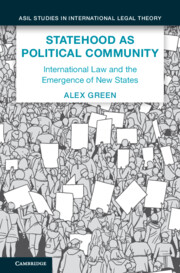Book contents
- Statehood as Political Community
- ASIL Studies in International Legal Theory
- Statehood as Political Community
- Copyright page
- Dedication
- Epigraph
- Contents
- Acknowledgements
- List of International Instruments
- List of International Judgements and Awards
- List of Domestic Judgements and Legislation
- Introduction
- Part I Political Community
- Part II Stability, Legitimacy, and Democracy
- 5 The Stability Thesis
- 6 The Legitimacy Thesis
- 7 Democratic Legitimacy
- Conclusion
- Bibliography
- Index
5 - The Stability Thesis
from Part II - Stability, Legitimacy, and Democracy
Published online by Cambridge University Press: 15 February 2024
- Statehood as Political Community
- ASIL Studies in International Legal Theory
- Statehood as Political Community
- Copyright page
- Dedication
- Epigraph
- Contents
- Acknowledgements
- List of International Instruments
- List of International Judgements and Awards
- List of Domestic Judgements and Legislation
- Introduction
- Part I Political Community
- Part II Stability, Legitimacy, and Democracy
- 5 The Stability Thesis
- 6 The Legitimacy Thesis
- 7 Democratic Legitimacy
- Conclusion
- Bibliography
- Index
Summary
This chapter considers the first of two additional reconstructions of state creation under international law, both of which present alternatives to statehood as political community. I call this first alternative 'the stability thesis', given its core claim that the law of state creation is primarily explicable and provisionally justifiable, not in terms of international peace and friendly relations, rather than political community. Two versions of this rational reconstruction are considered. Under the first, stability is secured by seeking to eliminate controversy: on this 'modus vivendi' approach, only those standards that meet broad international consensus should be considered legally relevant to the creation of states. Under the second, which prioritises substance over consensus, international practice is reconstructed so as to prioritise legal standards that are maximally conducive to stability in and of themselves. Ultimately, I argue that we should reject both versions of the stability thesis. Although international peace is morally important, both within state creation and otherwise, it cannot function as the primary normative foundation for this area of law.
Keywords
- Type
- Chapter
- Information
- Statehood as Political CommunityInternational Law and the Emergence of New States, pp. 141 - 168Publisher: Cambridge University PressPrint publication year: 2024



